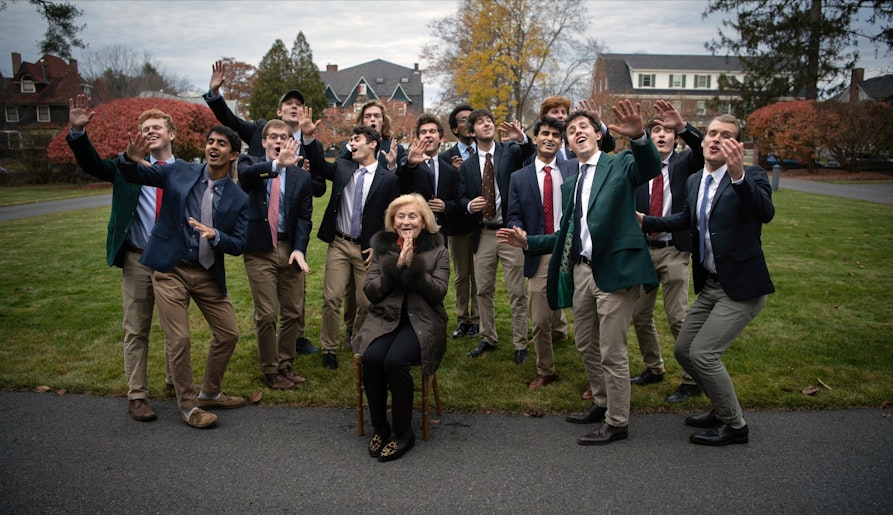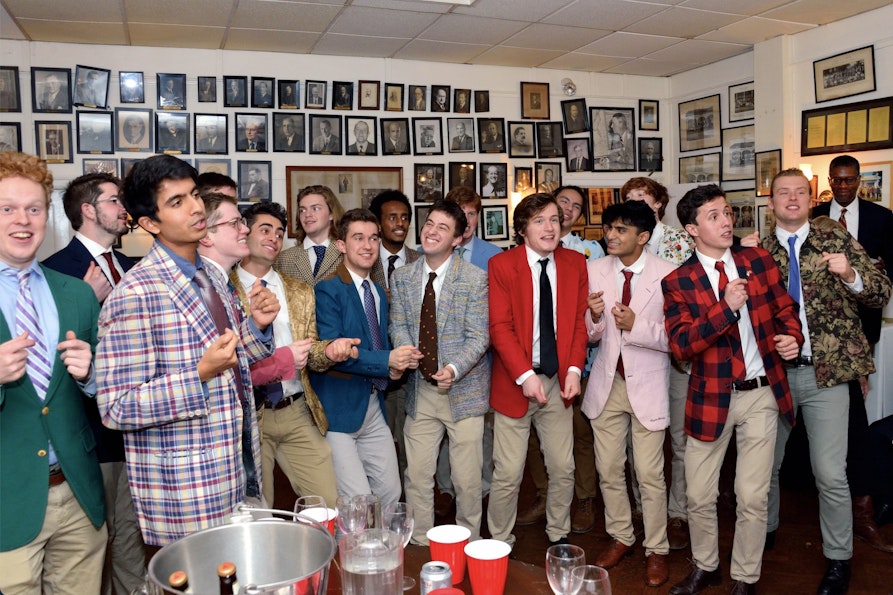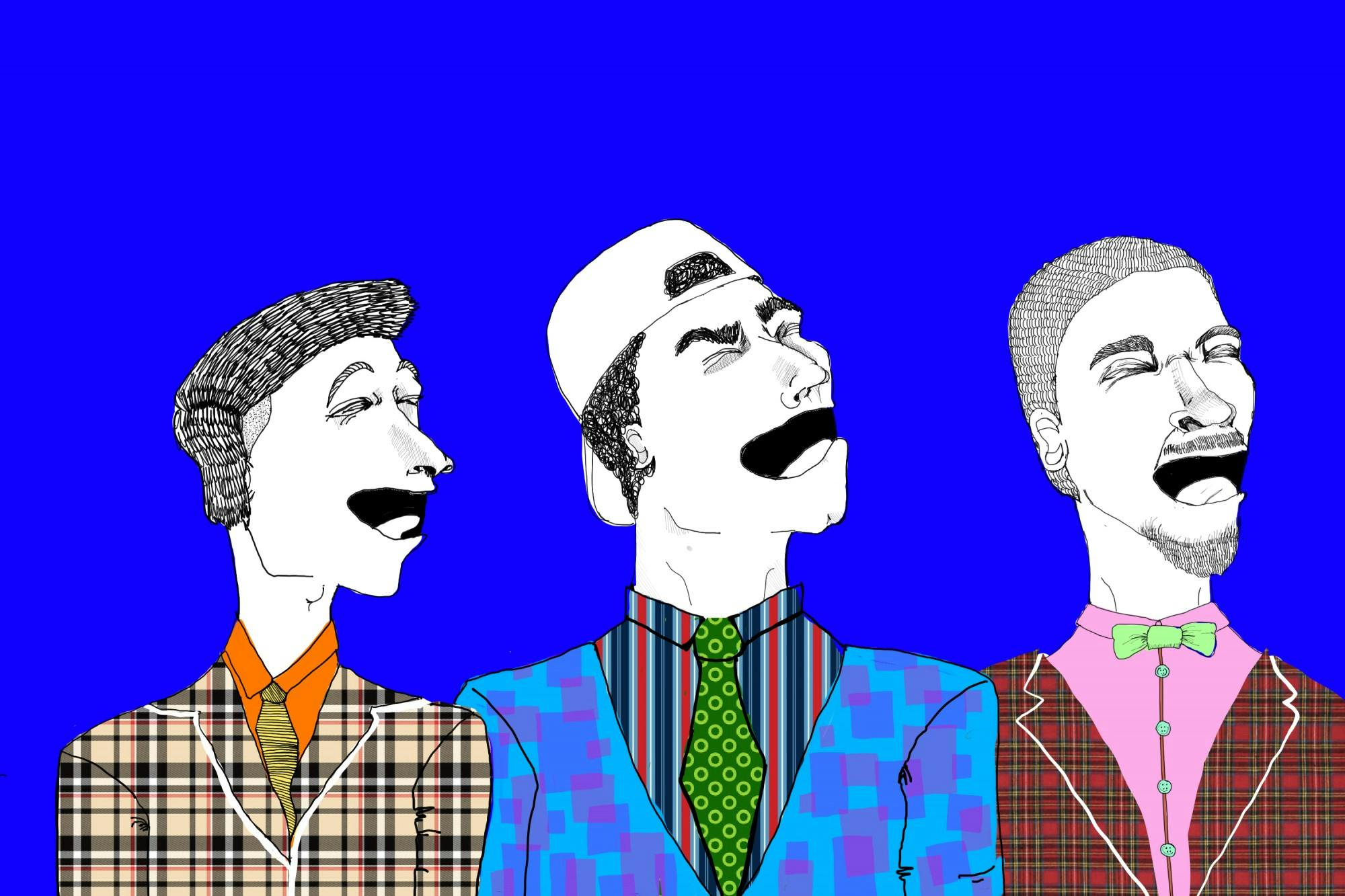This article is featured in the 2022 Winter Carnival special issue.
Upon first glance, it may seem odd that a cappella is given such a large spotlight when it comes to welcoming new students to the College — with performances both at Dimensions and during Orientation Week. Yet, watching these tight-knit groups of people singing together, bouncing across the stage in uniquely coordinated outfits is a wonderful collective memory that Dartmouth students share.
A cappella uniquely showcases much of what Dartmouth prides itself on: tradition, talent and community. As the first a cappella group founded at the College, the Dartmouth Aires embody these values — and with this year marking the group’s 75th anniversary, these values are all the more prominent.
“Because the Aires are so small and so tradition-laden, there’s a very good sense of institutional history in the group,” said Patrick Howard ’23, a member of the Aires. “We know traditionals and that’s like a solemn duty of the group — to keep up those old Dartmouth songs. The fact that there are songs all the alumni still know, the fact that we can expect over 100 of them to come back at any given anniversary… It does give you a sense of the history and length of time going back that not a lot of groups can.”

The Dartmouth Aires in October 1963. Photo courtesy of Rauner Special Collections Library.
The Aires, who declare themselves “one of the nation’s eminent a cappella ensembles,” have humble origins. The group began as a small offshoot of members from the College’s Glee Club in 1946, originally going by the racist name ‘Injunaires,’ according to Howard.
“There would be a group of maybe seven people [who] would come up during the intermission [of Glee Club performances] and perform a song a cappella,” said Howard. “And that was how the group existed for about 30 years. They rode off of the all-male choral group vibe that was apparently popular — until somewhere in the ’70s, when we changed our name to just ‘the Aires.’”
With their new name came the traditions that can still be seen in the group today. These include performing a mix of traditional and modern songs, having ‘Aires names’ — two syllable nicknames ending in ‘-o’ and ‘-trou’ — and the crazy outfits almost synonymous with the Aires themselves, according to Howard. This sense of legacy, coupled with rehearsals three times a week and a shared passion for making music together, makes the group of 15 to 20 men a uniquely tight community.
According to music director Jacob Donoghue ’22, the a cappella group will “definitely stay” with him even after he graduates.
“I think there’s something to be said about actively singing with people,” Donoghue said. “I know there’s been some research where a lot of the time when people are singing in unison, their heartbeats will actually sync up — which is pretty cool. I think there’s something to be said about everyone adding their own voices to create a shared experience that’s really special.”
According to alumni chair Sheil Sharma ’23, one key to this bond is “trou” — clothes that, Sharma notes, if an observer were “colorblind and pattern blind”, they would think “we were dressed up very nicely.” And though the brightly colored suit jackets and boldly patterned slacks may look random, “trou” serves a very specific purpose in the group, Howard said, and is essential for new members to assimilate into the characteristic traditions of the Aires.

Courtesy of Sheil Sharma '23.
“Because the group’s a smaller size and because you can’t recede into the background, being part of the Aires is being visible,” said Howard. “That’s the clothes and the dancing — that’s part of how we perform.”
Freshman member and recording chair Alan Hatch ’25 reflected on the importance of “trou” to the culture of the Aires and how it helps solidify bonds in the group.
“Whether it is being able to be silly and be okay with that and doing something that I might have thought was odd before — [the Aires have] kind of brought me out of my shell” said Hatch. “But also, it’s probably one of the first times in my life I’ve ever felt a sense of brotherhood. And it’s a really cool experience to be able to say that these are people I’m going to know and have such a good, strong, deep connection to, for the rest of my life.”
Many “trou” items are passed down through generations of alumni as bequests. Notably, there is a green jacket that belonged to the founder of the Aires in 1946 and a 50 year old baby blue suit that is a “sacred bequest” to the group’s music director each year, according to Howard. This tradition makes “trou” more than just a quasi-initiation task, but an important part of the Aires’ culture and key to both their identity and recognizability.
“When we’re wearing those jackets, there is a sense of being in a group that at least to me feels palpable — there is a sense of tradition, like putting on a uniform,” said Howard. “When we were in Boston on this past year’s tour, we were walking from a show somewhere in the middle of the city to an alumni house, and we got stopped by three different Dartmouth alums on the way — all in different places, just because they recognized the jackets.”

Source: Tim Ratner '63, courtesy of Sheil Sharma '23.
The Aires may be recognized by more recent graduates and current students due to their fun clothes and energetic performances of new hits such as Rufus’ ‘Tell Me Something Good’ and Taylor Swift’s ‘Blank Space,’ but to the members of the group, performing is not as light-hearted as it may seem.
“With how long the group’s been around, it is kind of cemented in the history of the College in a cool way — being able to be a part of that is really cool,” Howard said. “I don’t really know the words to describe it, but it does feel surreal — it feels like a bit of an honor to be putting on [old members’ clothes] and welcoming a bunch of people to their college experience via a cappella.”
The Aires are also popular among alumni, perhaps due to their performances of the Dartmouth traditionals — such as the alma mater, “Twilight Song” and the “Ivy League Medley” — “that maybe 30 or 40 years ago, people would actually go sing at football games, but are a little less present in current Dartmouth culture,” Sharma said.
“In my time in the Aires, we’ve performed for a lot of alumni reunions, and it’s been a really cool thing to see people still being tethered to Dartmouth at that age,” Donoghue said. “All of them loved Dartmouth enough that they came back. All of them could still sing the words to the songs, and that’s been a pretty unique experience.”
Even stronger than the nostalgia the general Dartmouth alumni network gets from the Aires is the Aires alumni themselves. With reunions every three years, the undergraduate members “make a point to stay pretty close to the alumni,” even holding gatherings on Zoom throughout the pandemic, according to Sharma and Howard.
“At reunions, there’s a day where you just have this big concert and different groups from different time periods [of the Aires] will go up and sing songs,” Donoghue said. “Sometimes, there are a couple songs that have been in the group ever since our founding, so everyone will go up and sing and that’s really fun. Sometimes, you’ll get some people from the ’60s going up and singing sea shanties and stuff like that.”
Looking to their 75th anniversary reunion this spring, around 200 people have already RSVP’d — including Aires alumni and their families dating back to the Class of 1946.
“We’re just super grateful to [our alumni] for putting in so much work to schedule these reunions because it’s something that we love as undergrads,” Sharma said. “There’s a whole alumni Board of grown-ups who care enough about this group to put in a ton of time to make [this 75th celebration] happen.”
After multiple years of COVID-19 protocols, the Aires are thrilled to be back singing together in person. And for three of the four classes, this spring will be their first introduction to a “normal” Aires reunion.
“I’m really excited to see what happens in May — when all the years come back and we’re able to really celebrate what it means to be a part of this group that’s so important to us and also to the institution of the College,” Sharma said.




